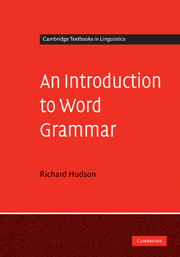10 - English words
Published online by Cambridge University Press: 05 June 2012
Summary
Word-classes
Summary of Section 6.3:
• Like all other concepts, words belong to general categories, variously called word-classes, lexical classes or parts of speech.
• These form a taxonomy in which classes can be divided into subclasses.
• The broad outline of our modern taxonomy of word-classes was first proposed for Latin and Greek 2,000 years ago.
Section 6.3 included a traditional list of word-classes for English: noun, adjective, pronoun, preposition, verb, adverb, article and conjunction. Not surprisingly, perhaps, the recent attention to English grammar has revealed a number of serious weaknesses in the details of the traditional system which we consider more carefully in Section 10.3, but meanwhile we can review the main changes that are needed when we test the traditional classes against modern theoretical standards.
Most of the traditional classes pass the test with flying colours, which is perhaps part of the reason why they have survived for 2,000 years. Modern grammarians still talk about NOUNS, PRONOUNS, VERBS, ADJECTIVES, ADVERBS, PREPOSITIONS and CONJUNCTIONS. These word-classes all play an important part in any modern grammar of English because they each express a bundle of generalizations that couldn't otherwise be expressed. In other words, it would simply be impossible to write a revealing grammar of English without recognizing these classes.
Of course, the actual names we give to the classes are up for negotiation, but there's not much point in looking for modern-sounding alternatives to terms that are as well established as these.
- Type
- Chapter
- Information
- An Introduction to Word Grammar , pp. 251 - 278Publisher: Cambridge University PressPrint publication year: 2010

